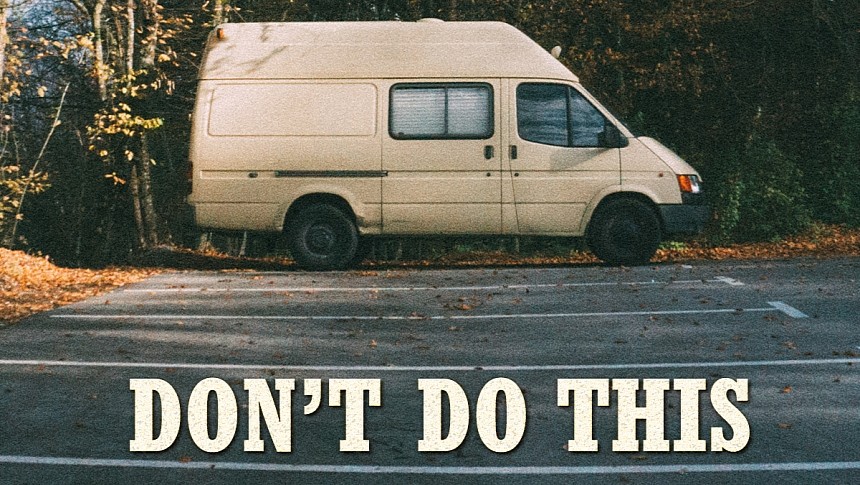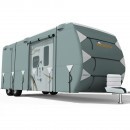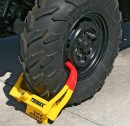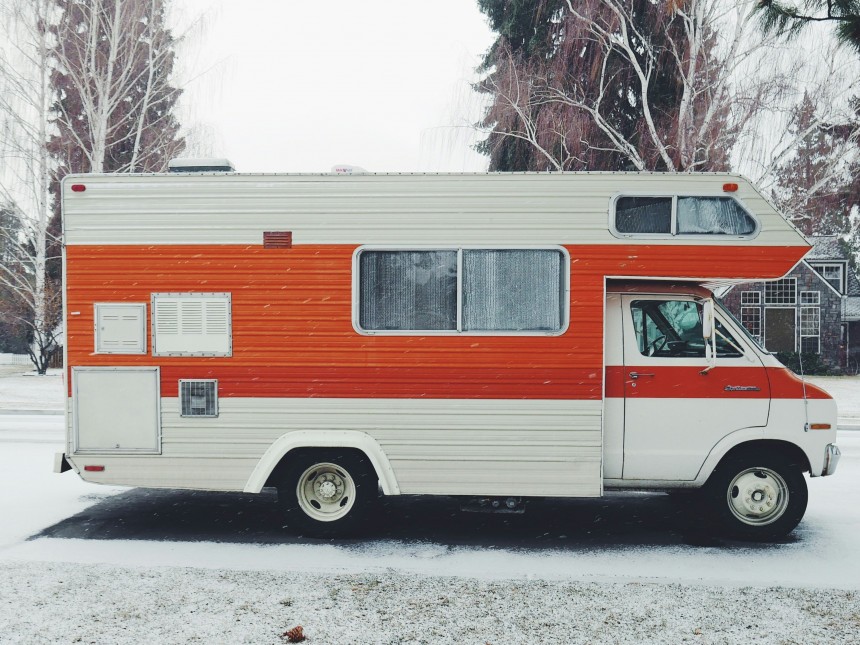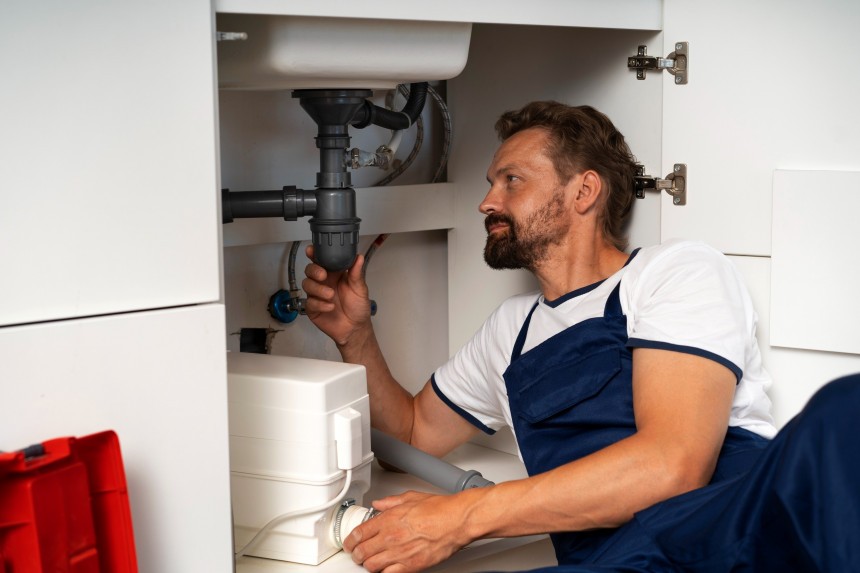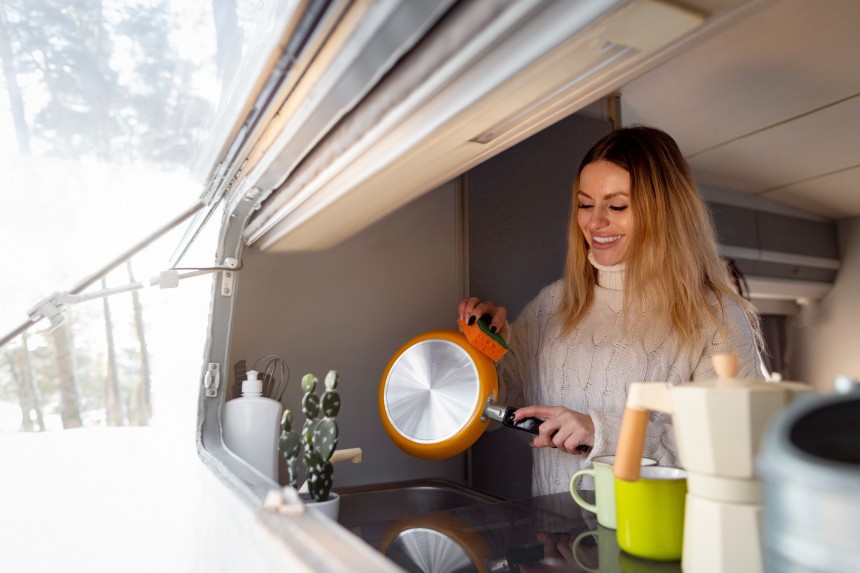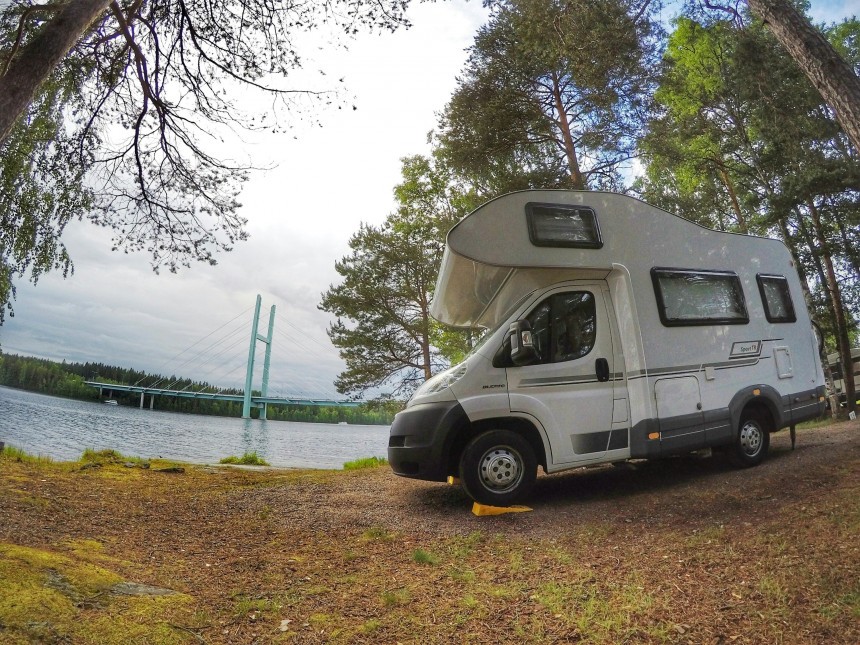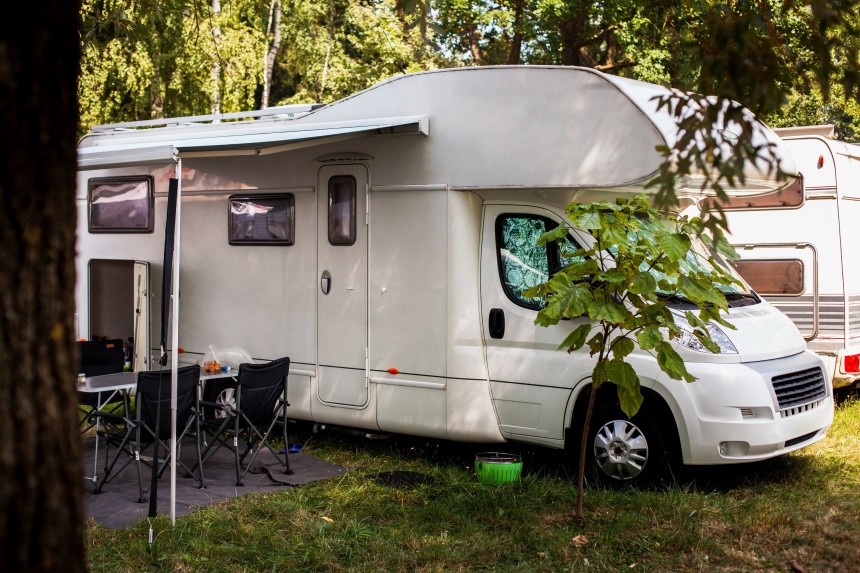Let's face it: few of the homes on wheels, whether we're talking about campers, RVs, trailers, or some other type, are fully prepared to withstand winter conditions. And with the cold season just around the corner, more and more mobile homes will "go into hibernation" until we experience warmer weather again. Of course, there are many other reasons why people choose to (or have to) store away their tiny homes. Today, I'll discuss the best ways to store and protect your vehicle, regardless of the season.
According to a study done in 2021, 11.2 million US households owned an RV. The industry is on the rise, and 61% of Americans report they are planning a road trip or vacation in an RV this year, a 13% rise from 2022. However, only about one million Americans live as full-time RVers, meaning the million other vehicles must be stored safely for the next trip.
I've divided this article into two sections: Storage and Security. But before we go into detail, let me clarify something regarding these terms typically referred to in the RV world. The words "RV" and "camper" are often used interchangeably – some only refer to campers as vehicles that can be pulled, towed, or attached to another car, while RVs can be driven on their own.
But then you have the term "camper van," which would typically fit under the RV umbrella. Anyway, I'm not here to discuss terminology – my point is that these vehicles can be treated mostly the same when it comes to storage and security.
There are really two main options to store your vehicle: keep it on your own property or pay to store it on someone else's property.
For the first option, you'll need to check with your homeowner's association or determine if any regulations restrict you from parking RVs. If that's not the case, you must ensure your property is large enough and safe enough for your RV. If you park it on your driveway, it'll not only be prone to all weather conditions, but it could be a target for thieves.
The other option can be a commercial RV storage facility – there are more and more popping up across the US since RVing is becoming increasingly popular. Check multiple ones in the area and weigh your options to determine which one fits your needs and budget. Some factors include whether the site is gated and safe, whether you have 24/7 access, and what amenities you have there.
Regardless of whether you're parking your RV during the scorching summer heat or in freezing temperatures, one thing you must consider is protecting its exterior from the sun, which can fade the paint or decals of your RV. Moreover, the sun can heat your RV's interior, putting its features at risk.
Of course, the sun isn't the only issue. Rain and snow can gather on the roof, and if left unattended, might lead to leaks and the need to carry out a complete roof repair. Moreover, dirt and debris can cause black streaks when rain rinses it off.
The best solution to this is getting your hands on an RV cover. It will repel UV rays, keep temperatures low, and protect your paint and decals. Keep in mind that you can't just simply buy a cover and throw it on your vehicle – the best practice would be to thoroughly wash your RV, wax it, and then attach the cover.
Other considerations are choosing an RV cover with ventilation to prevent mold, and if you want to store it in an area with high winds, buy one that can be properly strapped to your tiny home. Furthermore, if you're in a colder climate, you need a heavy-duty material. On the other hand, if you're dealing with humidity, a breathable fabric for your RV cover is the go-to.
If your RV comes with slides, ensure they're all the way in and secure – leaving them open even a bit can lead to wear and tear and even water leaks.
One option is the King Bird RV cover, currently available on Amazon for $220 for the smallest version (18 - 20 ft.). Alternatively, the Leader Accessories RV cover is discounted to $210 for the same size.
If your rig will be in an area that experiences freezing temperatures, you have to drain your plumbing components or at least winterize them. If you don't, your pipes will crack, and you might get water damage inside your mobile home.
The best way to care for your plumbing is to check the owner's manual and follow the instructions there. A helpful tip is to use RV antifreeze (don't use regular antifreeze) to winterize your pipes.
When leaving your RV parked for a long time, it's best to check the plumbing for leaks or other issues and repair them beforehand. What's more, ensure all the holding tanks (including black and grey tanks) are empty, or else you might find mold and algae inside once you want to get back on the road.
This also applies to any features inside that hold water, such as the fridge and ice makers – make sure to defrost them.
If you leave the RV in a warm and moist climate, you want to keep moisture out. You can opt for a dehumidifier to prevent mold and mildew from appearing inside. A helpful tip is to open all doors inside the RV (even for cabinets and closets) to ensure all areas are adequately ventilated. Furthermore, charcoal and silica gel packets will also help absorb moisture.
It's critical to allow for adequate airflow inside, which you can do by slightly opening the air vents. They should be opened enough to enable air circulation but not too much to allow rain to leak inside.
By the way, it's best you clean and condition all the materials inside, including the dashboard, leather seats, flooring, upholstery, wood, and plastics.
The last thing you want to discover when you return to your RV is a pest infestation. During colder months, an RV is the perfect spot for them to take shelter. Even if you store your RV in an enclosed storage facility, you can't eliminate the risks of them getting inside your tiny home.
Once they get inside, they'll do what they do best: start breeding. Once that happens, it's often too late to remove them yourself – you'll require the (often expensive) services of a pest control professional.
There are multiple steps you can take to prevent infestations from all sorts of pests, including insects and rats. The first one is cleaning your RV's interior - you do not want any crumbs (make sure to vacuum crumb-catching areas) or any other leftover food inside, including items like sugar, pasta, or any other dried foods. Moreover, having old food spoiling in an enclosed RV will make it smell horrible.
Another helpful tip is to plug all the drains inside your vehicle, such as those for the sink and the showers. Moreover, make sure to close the toilet seats.
Most RVs and campers come with roof and exterior vents, which typically feature screens. Although they're enough for larger insects, they won't prevent smaller varieties of insects from getting inside. As a solution, you can install small insect screens with finer meshes.
Pests will grab any opportunity to enter your tiny home on wheels. That's why it's important to check your RV's exterior, even its underside, for any cracks or open areas. They might also make their way through door frames and window frames. Make sure all are properly sealed.
Insects are also attracted to the chemical in your propane tank that gives it that nasty smell. Make sure to cover the refrigerator vents, furnace vents, and water heater vents to prevent any nests from forming.
Besides all these preventative measures, you could actually tackle pests more proactively by spreading pest control products, such as Diatomaceous Earth, which is non-toxic for humans yet will kill all insects.
Depending on the type of tiny home you have, you'll have to mechanically prepare it for long-term storage. Tires are one of the components that must be properly maintained. When an RV sits idle, the tires can develop flat spots.
The best way to counteract this is to move the RV from time to time, or if that's not possible, ask someone else to do it. If that's not an option, you can place pieces of plywood under the tires – ensure the wood is wider than the tire and that no part of the tire hangs over the edge. Moreover, tires are also susceptible to damage from weather conditions, and one way to protect them is to use covers.
If your rig features leveling jacks, make sure to put them down. Furthermore, if your RV will be parked on grass or dirt, you'll need to use pads under the jacks so they won't sink into the ground.
If you have a fuel tank in your RV (meaning it's not a trailer), the best practice is to fill the fuel tank and add a fuel stabilizer, which will prevent the fuel from deteriorating and causing damage to your engine. The Sta-Bil fuel stabilizer is one option, protecting your engine from gum, varnish, rust, and corrosion. Moreover, the Happy Fuel premium fuel stabilizer is a more expensive option, but its maker claims it's "the highest quality and best performing fuel stabilizer available."
The best way to maintain an engine would be to start and run it about once a month to keep its components lubricated. Furthermore, changing your oil before storing your RV for the winter is a good idea. Another must is disconnecting the propane system.
The only thing worse than finding your RV damaged is not finding it at all. I'll list some of the best security measures you can add, most of which are suitable for use even when traveling in your tiny home.
Before I list the best measures, let me tell you some of the simpler things you can do to prevent ill-intended people from getting inside your mobile home or even stealing it altogether. First, shut all windows and close all blinds, curtains, or shades – if you use an RV cover, even better.
Continuing what I mentioned at the beginning of the article, research where you'll leave your RV for storage, as thieves target certain areas more than others. A visible site in a well-lit area with security personnel would be the best choice.
Before storing your RV for a longer time, remove all expensive items. Better said, remove as much as possible. While traveling, you could even use a safe to store all your valuables.
It's best to have proper locks on your camper – most standard ones are not enough to keep your vehicle secure, as they're easy to pick or break into. Invest in a high-quality, durable lock.
It's also essential to find the right security system for your RV. Many options are available, such as solar-powered cameras, an alarm system, motion-detecting lights, or a more advanced camera surveillance system that provides app connectivity, allowing you to connect from afar to check on your mobile home and even be alerted in case of anything.
Here are some suggestions for the products mentioned above. Regarding solar-powered cameras, the ieGeek camera is discounted to $50, takes one minute to install, and doesn't require any additional wiring. Alternatively, the solar camera from PM Popcake costs $40 and is similarly equipped to ieGeek's version.
A GPS tracking device might save the day in the worst-case scenario of your camper going missing. Put a couple of these in a well-hidden location, and you can tell the police where to go to recover your mobile home. The Spytec GPS GL300 tracker costs just $14.4, but you could go even cheaper with the Tracki GPS Tracker, which is currently priced at $8. Both require a subscription to work, but they will surely do their job.
When dealing with trailer campers, there are some additional ways to secure them. For instance, you can use a tongue lock, which attaches to your trailer's coupler, where it connects to your ball hitch. The Rhino USA lock is a good option for $50, but if you don't mind spending a few extra dollars, you could look at the Trimax UMAX100.
Another measure is a chock lock – it attaches to your wheel to prevent it from turning. Moreover, choose a brightly colored one to deter thieves from even trying to drive away your vehicle. These products might also fit on a standard RV. The Trimax chock lock (the one in the picture above) is currently discounted by 37% to $69. Furthermore, the Tevlaphee chock lock is a more budget-friendly option, priced at $31, that will also do the job.
And that's about it for storing and securing your tiny homes on wheels. If you're not ready to part ways with your mobile home, make sure you're prepared for your next adventure by checking out this list of 10 must-have camper and RV accessories.
Let me know in the comments what other measures you take to ensure your RV withstands long-term storage.
I've divided this article into two sections: Storage and Security. But before we go into detail, let me clarify something regarding these terms typically referred to in the RV world. The words "RV" and "camper" are often used interchangeably – some only refer to campers as vehicles that can be pulled, towed, or attached to another car, while RVs can be driven on their own.
But then you have the term "camper van," which would typically fit under the RV umbrella. Anyway, I'm not here to discuss terminology – my point is that these vehicles can be treated mostly the same when it comes to storage and security.
Storage
So, what could could go wrong? I won't list all the issues that might pop up, but know that the answer is "a lot." Your internal facilities, such as water pipes, could burst, the RV's body might be compromised, or you could get all sorts of infestations, to name a few. So, making sure you're storing your tiny home adequately is critical.Where do you store your camper/ RV?
For the first option, you'll need to check with your homeowner's association or determine if any regulations restrict you from parking RVs. If that's not the case, you must ensure your property is large enough and safe enough for your RV. If you park it on your driveway, it'll not only be prone to all weather conditions, but it could be a target for thieves.
The other option can be a commercial RV storage facility – there are more and more popping up across the US since RVing is becoming increasingly popular. Check multiple ones in the area and weigh your options to determine which one fits your needs and budget. Some factors include whether the site is gated and safe, whether you have 24/7 access, and what amenities you have there.
How to prepare an RV for Storage
Now that we've got that covered let's delve into the best practices for RV storage. I'll cover various tips and tricks in no particular order. Before you listen to any of these tips, read the owner's manual, as it will provide specific storage instructions – some mobile homes require special preparation for storage.RV Cover
Of course, the sun isn't the only issue. Rain and snow can gather on the roof, and if left unattended, might lead to leaks and the need to carry out a complete roof repair. Moreover, dirt and debris can cause black streaks when rain rinses it off.
The best solution to this is getting your hands on an RV cover. It will repel UV rays, keep temperatures low, and protect your paint and decals. Keep in mind that you can't just simply buy a cover and throw it on your vehicle – the best practice would be to thoroughly wash your RV, wax it, and then attach the cover.
Other considerations are choosing an RV cover with ventilation to prevent mold, and if you want to store it in an area with high winds, buy one that can be properly strapped to your tiny home. Furthermore, if you're in a colder climate, you need a heavy-duty material. On the other hand, if you're dealing with humidity, a breathable fabric for your RV cover is the go-to.
If your RV comes with slides, ensure they're all the way in and secure – leaving them open even a bit can lead to wear and tear and even water leaks.
One option is the King Bird RV cover, currently available on Amazon for $220 for the smallest version (18 - 20 ft.). Alternatively, the Leader Accessories RV cover is discounted to $210 for the same size.
Protecting your Battery
One critical component that requires adequate protection is the battery. Just like with most conventional vehicles, if your RV sits for a long time, it's best to disconnect the battery to avoid draining it. Storing it in a garage or somewhere protected from the elements is even better, as it won't go through excessive heat or cold. This applies to all the batteries you have in your RV, not just the main one. Another option is using a battery tender to keep the batteries charged while you're away. Lastly, turn off the main breaker and unplug all appliances.Plumbing Care
The best way to care for your plumbing is to check the owner's manual and follow the instructions there. A helpful tip is to use RV antifreeze (don't use regular antifreeze) to winterize your pipes.
When leaving your RV parked for a long time, it's best to check the plumbing for leaks or other issues and repair them beforehand. What's more, ensure all the holding tanks (including black and grey tanks) are empty, or else you might find mold and algae inside once you want to get back on the road.
This also applies to any features inside that hold water, such as the fridge and ice makers – make sure to defrost them.
Controlling Moisture
Humidity and moisture can devastate your RV interior. Depending on where you store your vehicle, you'll need to decrease or even increase moisture inside. If you leave it in a dry climate, the RV components are susceptible to cracking. To counter this, you can place a large bucket of water (a 5-gallon bucket should be enough) in the center of your RV, which will create enough moisture to keep wood from drying and cracking.If you leave the RV in a warm and moist climate, you want to keep moisture out. You can opt for a dehumidifier to prevent mold and mildew from appearing inside. A helpful tip is to open all doors inside the RV (even for cabinets and closets) to ensure all areas are adequately ventilated. Furthermore, charcoal and silica gel packets will also help absorb moisture.
It's critical to allow for adequate airflow inside, which you can do by slightly opening the air vents. They should be opened enough to enable air circulation but not too much to allow rain to leak inside.
By the way, it's best you clean and condition all the materials inside, including the dashboard, leather seats, flooring, upholstery, wood, and plastics.
Preventing Infestations
Once they get inside, they'll do what they do best: start breeding. Once that happens, it's often too late to remove them yourself – you'll require the (often expensive) services of a pest control professional.
There are multiple steps you can take to prevent infestations from all sorts of pests, including insects and rats. The first one is cleaning your RV's interior - you do not want any crumbs (make sure to vacuum crumb-catching areas) or any other leftover food inside, including items like sugar, pasta, or any other dried foods. Moreover, having old food spoiling in an enclosed RV will make it smell horrible.
Another helpful tip is to plug all the drains inside your vehicle, such as those for the sink and the showers. Moreover, make sure to close the toilet seats.
Most RVs and campers come with roof and exterior vents, which typically feature screens. Although they're enough for larger insects, they won't prevent smaller varieties of insects from getting inside. As a solution, you can install small insect screens with finer meshes.
Pests will grab any opportunity to enter your tiny home on wheels. That's why it's important to check your RV's exterior, even its underside, for any cracks or open areas. They might also make their way through door frames and window frames. Make sure all are properly sealed.
Insects are also attracted to the chemical in your propane tank that gives it that nasty smell. Make sure to cover the refrigerator vents, furnace vents, and water heater vents to prevent any nests from forming.
Besides all these preventative measures, you could actually tackle pests more proactively by spreading pest control products, such as Diatomaceous Earth, which is non-toxic for humans yet will kill all insects.
Mechanical Preparations
The best way to counteract this is to move the RV from time to time, or if that's not possible, ask someone else to do it. If that's not an option, you can place pieces of plywood under the tires – ensure the wood is wider than the tire and that no part of the tire hangs over the edge. Moreover, tires are also susceptible to damage from weather conditions, and one way to protect them is to use covers.
If your rig features leveling jacks, make sure to put them down. Furthermore, if your RV will be parked on grass or dirt, you'll need to use pads under the jacks so they won't sink into the ground.
If you have a fuel tank in your RV (meaning it's not a trailer), the best practice is to fill the fuel tank and add a fuel stabilizer, which will prevent the fuel from deteriorating and causing damage to your engine. The Sta-Bil fuel stabilizer is one option, protecting your engine from gum, varnish, rust, and corrosion. Moreover, the Happy Fuel premium fuel stabilizer is a more expensive option, but its maker claims it's "the highest quality and best performing fuel stabilizer available."
The best way to maintain an engine would be to start and run it about once a month to keep its components lubricated. Furthermore, changing your oil before storing your RV for the winter is a good idea. Another must is disconnecting the propane system.
Security
Before I list the best measures, let me tell you some of the simpler things you can do to prevent ill-intended people from getting inside your mobile home or even stealing it altogether. First, shut all windows and close all blinds, curtains, or shades – if you use an RV cover, even better.
Continuing what I mentioned at the beginning of the article, research where you'll leave your RV for storage, as thieves target certain areas more than others. A visible site in a well-lit area with security personnel would be the best choice.
Before storing your RV for a longer time, remove all expensive items. Better said, remove as much as possible. While traveling, you could even use a safe to store all your valuables.
It's best to have proper locks on your camper – most standard ones are not enough to keep your vehicle secure, as they're easy to pick or break into. Invest in a high-quality, durable lock.
Here are some suggestions for the products mentioned above. Regarding solar-powered cameras, the ieGeek camera is discounted to $50, takes one minute to install, and doesn't require any additional wiring. Alternatively, the solar camera from PM Popcake costs $40 and is similarly equipped to ieGeek's version.
A GPS tracking device might save the day in the worst-case scenario of your camper going missing. Put a couple of these in a well-hidden location, and you can tell the police where to go to recover your mobile home. The Spytec GPS GL300 tracker costs just $14.4, but you could go even cheaper with the Tracki GPS Tracker, which is currently priced at $8. Both require a subscription to work, but they will surely do their job.
When dealing with trailer campers, there are some additional ways to secure them. For instance, you can use a tongue lock, which attaches to your trailer's coupler, where it connects to your ball hitch. The Rhino USA lock is a good option for $50, but if you don't mind spending a few extra dollars, you could look at the Trimax UMAX100.
Another measure is a chock lock – it attaches to your wheel to prevent it from turning. Moreover, choose a brightly colored one to deter thieves from even trying to drive away your vehicle. These products might also fit on a standard RV. The Trimax chock lock (the one in the picture above) is currently discounted by 37% to $69. Furthermore, the Tevlaphee chock lock is a more budget-friendly option, priced at $31, that will also do the job.
And that's about it for storing and securing your tiny homes on wheels. If you're not ready to part ways with your mobile home, make sure you're prepared for your next adventure by checking out this list of 10 must-have camper and RV accessories.
Let me know in the comments what other measures you take to ensure your RV withstands long-term storage.
